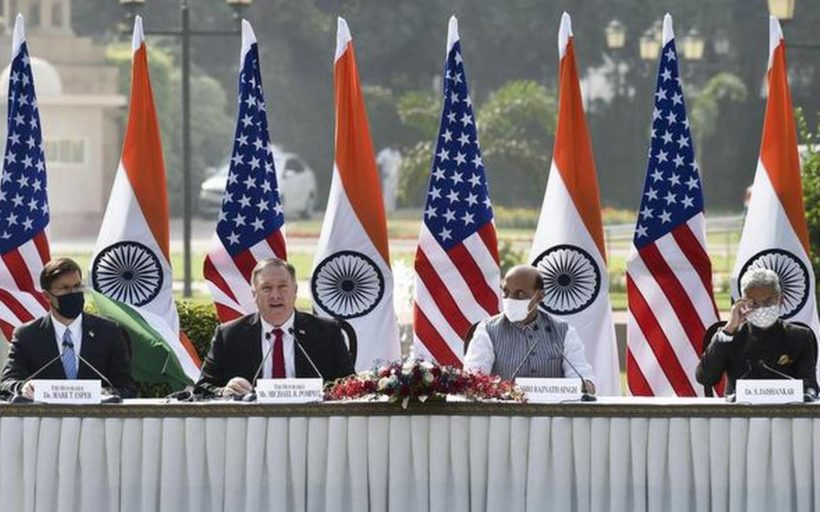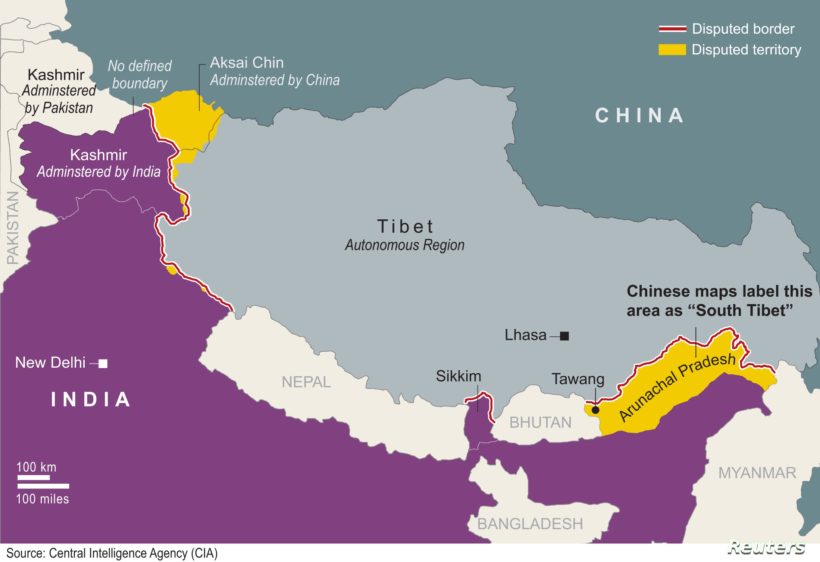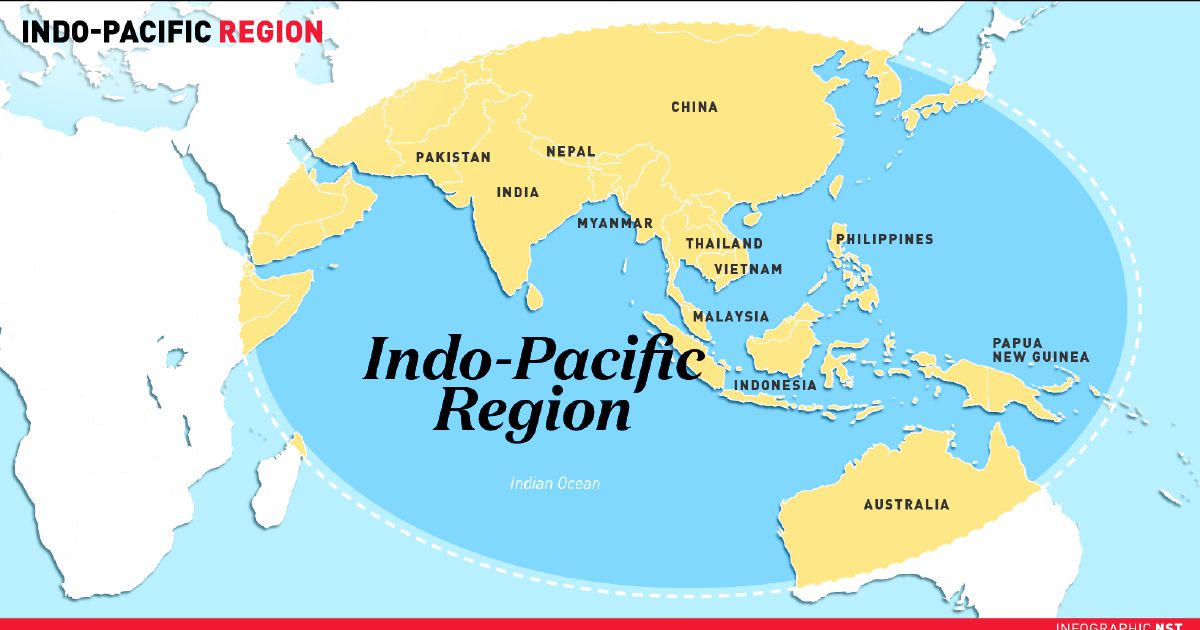
India's Defense Minister Rajnath Singh, India's External Affairs Minister S. Jaishankar, U.S. Secretary of State Mike Pompeo and U.S. Secretary of Defence Mark Esper during a press statement, at Hyderabad House in New Delhi, on October 27, 2020. (Photo: PTI)
redo Jump to...
print Print...
(by Anjana Pasricha, VOA) — NEW DELHI – India and the United States have signed a landmark agreement to share military information and vowed to ramp up security and strategic ties as top U.S. officials emphasized the need for enhanced cooperation to confront Chinese assertiveness in the Indo-Pacific region.
“Our leaders and our citizens see with increasing clarity that the CCP (Chinese Communist Party) is no friend to democracy, the rule of law, transparency, nor to freedom of navigation, the foundation of a free and open and prosperous Indo-Pacific,” Secretary of State Mike Pompeo told reporters in New Delhi. He and U.S. Defense Secretary Mark Esper met their Indian counterparts (Indian Foreign Minister Subrahmanyam Jaishankar and Indian Defense Minister Rajnath Singh) [in New Delhi] on Tuesday, Oct. 27.
New Delhi was the first stop of a four-nation Asia tour that Pompeo has said will focus on the “threats” posed by China.
The Basic Exchange and Cooperation Agreement on Geospatial Cooperation (BECA) signed on Tuesday will give India access to [advanced U.S. map and satellite imagery to enhance accuracy of Indian weapons, drones and missiles].
It is the last of four pacts that the two countries have sealed in recent years, setting the ground for significantly bolstering their military partnership.
…Although Indian officials did not directly refer to China, Foreign Minister Jaishankar called the movement of the relationship with Washington “exceptionally positive,” while Esper emphasized their growing cooperation in the region.
[Esper also said that India and the United States are working to establish dialogue regarding in cybersecurity and space domains].“Based on our shared values and common interests, we stand shoulder to shoulder in support of a free and open Indo-Pacific for all, particularly in light of increasing aggression and destabilizing activities by China,” Esper said.
The talks were held as India remains locked in a months-long military standoff with Beijing on its borders and concerns grow in Washington about China’s [aggressive actions] from Hong Kong and the South China Sea to the Himalayas.
Before heading into the talks, the U.S. officials paid tribute to Indian troops at a war memorial, including 20 soldiers who [were killed by Chinese troops, as they were unarmed and caught by surprise in a contested border area].
“The United States will stand with the people of India as they confront threats to their freedom and sovereignty,” Pompeo said.
…The pact signed between New Delhi and the U.S. on Tuesday has been under negotiation for nearly a decade, but India had been hesitant.
“India has been very cautious in the past, but it is now taking a more categorical position,” according to Harsh Pant, director of studies at the Observer Research Foundation in New Delhi. “Basically, as China challenges India on its borders, New Delhi is now out in the open about aligning its priorities with the U.S. and like-minded countries in the Indo-Pacific.”
…From India, Pompeo traveled to Sri Lanka, the Maldives and Indonesia in a bid to bolster allies in the Indo-Pacific – these are all strategically located countries that Washington hopes can play a role in pressing back against Beijing in the region.
The visit to Sri Lanka, where a government widely seen as pro-China was elected in August, is seen as a pushback against Beijing’s influence in the Indian Ocean country that has seen a flood of Chinese investment in the past decade.
Pompeo’s Asia tour follows his visit earlier this month to Tokyo for a meeting among the U.S., India, Japan and Australia, a group known as “the Quad” that also aims to be a counterweight to China in the Indo-Pacific region.
In a sign that the “Quad” countries are set to enhance their cooperation, Australia next week is set to join naval exercises that have in the past been held by the U.S., Indian and Japanese navies.
Published at voa .com. Reprinted here for educational purposes only. May not be reproduced on other websites without permission from Voice of America.
Questions
NOTE: Before answering the following questions, read the info under “Background” and watch the video under “Resources” below.
1. List the who, what, where and when of the news report.
2. For what reason has the Trump administration made this agreement with India? Be specific.
3. What will the U.S.-India BECA do?
4. a) What is the purpose of BECA, according to the news anchor from India’s WION news in the video under “Resources” below?
b) Why is the geo-spatial intelligence important to India?
5. a) Considering the many recent reports on communist China’s aggression in the region (and against the U.S.) how important do you think this agreement with India is for the U.S.?
b) Ask a parent the same question.
Background
Both India and the US are due to participate in the upcoming Malabar naval exercises which will be held in the Indian Ocean next month. The drills will feature all members of the “Quad,” an informal alliance of the US, India, Japan and Australia, which has been proposed by some as a potential “Asian NATO,” intended to counterbalance Chinese military strength in the region.
In a meeting of the Quad earlier this month in Tokyo, US Secretary of State Mike Pompeo [spoke strongly] against the “Chinese Communist Party’s coverup” in the initial stages of the coronavirus pandemic, and saying “it is more critical now than ever that we collaborate to protect our people and partners from the CCP’s exploitation, corruption, and coercion.”
Speaking to reporters after that meeting, a senior State Department official said that “there’s no avoiding the fact that it’s China and its actions in the region that make the Quad actually matter and function this time around.” (from a CNN report)
Resources
Read the text of the meeting with Secretaries Esper and Pompeo and their Indian counterparts at state.gov.
Watch a new report from Indian TV WION:
Daily “Answers” emails are provided for Daily News Articles, Tuesday’s World Events and Friday’s News Quiz.





